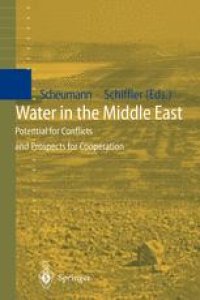
Ebook: Water in the Middle East: Potential for Conflicts and Prospects for Cooperation
- Tags: Environmental Economics, Economics general, Landscape/Regional and Urban Planning, Geoengineering Foundations Hydraulics, Hydrogeology, Environmental Law/Policy/Ecojustice
- Year: 1998
- Publisher: Springer-Verlag Berlin Heidelberg
- Edition: 1
- Language: English
- pdf
In the 1980s, scientists, politicians and journalists frequently emphasized, particularly on the Jordan, Euphrates and Nile Rivers, that conflicts over shared water resources would lead to "water wars". A closer analysis shows that non-water issues have played the major role when conflicts in the region became heated, with the water issue being politically implemented. However, the unregulated and unequitable access to international rivers and the unilateral development of irrigated agriculture add to already high political tensions. The authors reveal that multilateral agreements over shared waters are a realistic option even in politically strained situations, if the expected costs of non-agreement are perceived as too high. If cooperation is beneficial to all Middle East nation states, it is easier to shift from overemphasis on national sovereignty to the concept of restricted national sovereignty and integrity which corresponds to international law.
In the 1980s, scientists, politicians and journalists frequently emphasized, particularly on the Jordan, Euphrates and Nile Rivers, that conflicts over shared water resources would lead to "water wars". A closer analysis shows that non-water issues have played the major role when conflicts in the region became heated, with the water issue being politically implemented. However, the unregulated and unequitable access to international rivers and the unilateral development of irrigated agriculture add to already high political tensions. The authors reveal that multilateral agreements over shared waters are a realistic option even in politically strained situations, if the expected costs of non-agreement are perceived as too high. If cooperation is beneficial to all Middle East nation states, it is easier to shift from overemphasis on national sovereignty to the concept of restricted national sovereignty and integrity which corresponds to international law.
In the 1980s, scientists, politicians and journalists frequently emphasized, particularly on the Jordan, Euphrates and Nile Rivers, that conflicts over shared water resources would lead to "water wars". A closer analysis shows that non-water issues have played the major role when conflicts in the region became heated, with the water issue being politically implemented. However, the unregulated and unequitable access to international rivers and the unilateral development of irrigated agriculture add to already high political tensions. The authors reveal that multilateral agreements over shared waters are a realistic option even in politically strained situations, if the expected costs of non-agreement are perceived as too high. If cooperation is beneficial to all Middle East nation states, it is easier to shift from overemphasis on national sovereignty to the concept of restricted national sovereignty and integrity which corresponds to international law.
Content:
Front Matter....Pages I-XV
Introduction....Pages 1-8
Front Matter....Pages 9-9
International Water Law: Regulations for Cooperation and the Discussion of the International Water Convention....Pages 11-30
International Water Agreements: A Comparative View....Pages 31-45
The Middle East Peace Process: Obstacles to Cooperation over Shared Waters....Pages 47-55
Transboundary Externalities and Regional Integration....Pages 57-70
Contested Waters: Dividing or Sharing?....Pages 71-87
Front Matter....Pages 89-89
The Jordan River Basin: Prospects for Cooperation Within the Middle East Peace Process?....Pages 91-112
Conflicts on the Euphrates: An Analysis of Water and Non-water Issues....Pages 113-135
Conflicts over the Nile or Conflicts on the Nile?....Pages 137-150
Back Matter....Pages 151-191
In the 1980s, scientists, politicians and journalists frequently emphasized, particularly on the Jordan, Euphrates and Nile Rivers, that conflicts over shared water resources would lead to "water wars". A closer analysis shows that non-water issues have played the major role when conflicts in the region became heated, with the water issue being politically implemented. However, the unregulated and unequitable access to international rivers and the unilateral development of irrigated agriculture add to already high political tensions. The authors reveal that multilateral agreements over shared waters are a realistic option even in politically strained situations, if the expected costs of non-agreement are perceived as too high. If cooperation is beneficial to all Middle East nation states, it is easier to shift from overemphasis on national sovereignty to the concept of restricted national sovereignty and integrity which corresponds to international law.
Content:
Front Matter....Pages I-XV
Introduction....Pages 1-8
Front Matter....Pages 9-9
International Water Law: Regulations for Cooperation and the Discussion of the International Water Convention....Pages 11-30
International Water Agreements: A Comparative View....Pages 31-45
The Middle East Peace Process: Obstacles to Cooperation over Shared Waters....Pages 47-55
Transboundary Externalities and Regional Integration....Pages 57-70
Contested Waters: Dividing or Sharing?....Pages 71-87
Front Matter....Pages 89-89
The Jordan River Basin: Prospects for Cooperation Within the Middle East Peace Process?....Pages 91-112
Conflicts on the Euphrates: An Analysis of Water and Non-water Issues....Pages 113-135
Conflicts over the Nile or Conflicts on the Nile?....Pages 137-150
Back Matter....Pages 151-191
....